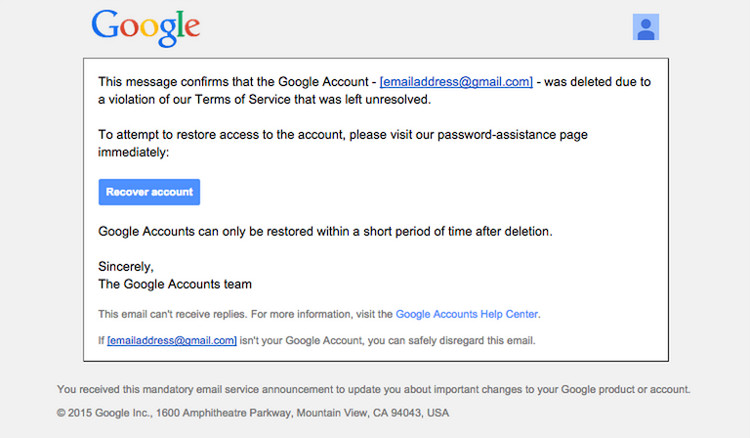Is your website one of the 90% that is breaking Google’s policies?

If your website is using Google Analytics, AdSense or certain features in AdWords, make sure you have read and understand the terms of service for each specific product.
Google requires specific disclosures in your privacy policy that explain the use of these services, and if you’re not familiar with the requirements, you may find yourself buried in the search results pages. Worse, you may find yourself suddenly losing access to these extremely helpful tools and programs.
The popular SEO information website, SearchEngineLand, performed a review of about two hundred random websites and revealed that:
- More than 90% were breaking at least one of Google’s policies
- More than 65% were breaking at least two of Google’s policies
- More than 40% were breaking at least three of Google’s policies
They also found that some sites in Google’s Top 1000 List were breaking at least two policies. The bottom line is that it never hurts to increase your awareness of Google website policies, especially knowing when and how policies have changed.
What happens if you violate Google’s terms of service?

Although technically, Google could sue you for not following its policies when using its products, a more effective weapon for Google is the loss of access to the program you are using. You may get off with a warning the first time, and if you do get a warning, pay attention and make changes. If not you could lose your method of driving traffic (AdWords), lose your ability to monetize your website (AdSense) or completely lose the ability to access your Google Analytics data.
Google doesn’t mess around and violations that go unresolved can have a significant impact on your ability to do business on the internet.
When it comes to your privacy policy, it’s also important that you consider it a legally binding document, not just for Google but for your customers also. There have been cases where the Federal Trade Commission (FTC) has brought legal action against companies that have included exaggerated statements in privacy policies. A legally sound privacy policy will ensure that all statements can be verified and that any promises made will be kept, even if the company is sold (e.g., data will not be sold, even to a new owner).
Must Read: Why did your AdSense account get banned?
Breaking Google’s policies

As you know, 90% businesses break Google’s privacy policy but most of it is by mistake or unintentional. So, here are some of the most common ways businesses break Google website policies.
Not Having a Google Privacy Policy Prominently Posted
According to Google Analytics Terms of Service:
“You must post a privacy policy and that policy must provide notice of your use of a cookie that collects anonymous traffic data.”
Believe it or not, prominently posting a privacy policy is the most commonly broken rule of the Google Analytics privacy policy. This simple component is very important because Google values transparency to the customer and uses this as part of the determination of your landing page quality score.
Lack of Transparency in Tracking Methods
![]()
This goes back to when AdWords conversion tracking first began and websites were required to identify when third-party tracking software was being used and the use of cookies to track anonymous data. Today, a simple statement that you use third-party cookies for data tracking will keep your website in compliance.
Additionally, the Terms of Service for Google Analytics states that:
“You must post a Privacy Policy and that Privacy Policy must provide notice of Your use of cookies that are used to collect data. You must disclose the use of Google Analytics, and how it collects and processes data.”
You can meet this requirement simply by displaying a prominent link to the site “How Google uses data when you use our partners’ sites or apps”, which is located at www.google.com/policies/privacy/partners/. Google may provide a new or replacement URL from time to time.
Remarketing With Sensitive Information or Without an Opt-Out Option
Google supports retargeting campaigns in which you can reach consumers across the content network who have visited your site previously. This powerful remarketing approach lets you serve an ad to someone who has already interacted with your website. This is a group that has a higher chance of converting than the average user. With remarketing you have multiple opportunities to reach consumers who:
- Converted, in order to deepen the relationship
- Did not convert, in order to try again
- Abandoned their shopping cart, in order to remind them
- Signed up for a newsletter or subscription
This is great for marketers, but Google understands this approach can feel creepy to consumers.
The first step to avoid policy violations when using remarketing is to create a privacy policy that describes the method used and provides an opt-out.
Generally, Google does not allow the use of sensitive information in ads, the implication that you know more about someone than you do in ads or the illegal use of ads, such as marketing to children under the age of 13. However, there are also industry specific remarketing rules to follow covering areas such as financial services. Be sure to review the specifics of your industry.
Helpful Information
 Not sure about Google’s policies? Here are some links for you to review and update yourself.
Not sure about Google’s policies? Here are some links for you to review and update yourself.
- Google Analytics Terms of Service
- Google AdWords Privacy Policy Requirements for Remarketing
- Google AdSense Terms and Conditions
Most policies vary according to the country where your billing address is located, so be sure to read the appropriate requirements for your area.
While all the legalese can be confusing, aligning your site with applicable policies is just good business. As consumers become increasingly nervous about the privacy of their online data, they may abandon your site for a competitor site that is providing the assurance they need that their online activity is safe and secure. Creating and posting your own privacy policy is simply a good business decision, whether it is required by local government or through the use of Google’s services.
Learn about website laws in the UK here.
Protect yourself. Don’t take a hit from Google

Know Your Own Privacy Policy
The best thing you can do is to know your own website’s privacy policy and understand what it says. Review it with a critical eye and ask yourself if there are any promises or guarantees that may not be fulfilled, even in extreme situations. If there are, rewording can mean the difference between being sued or not.
Privacy Policy Updates and Customer Review
Whenever you make a change after reviewing your privacy policy, make sure you have your customers or users opt-in again. You may have a provision that states you can change your own privacy policy at any time, but this is likely not enough. To protect yourself, make sure you give customers and users the option to opt-in to your new policy or to discontinue allowing you to have their private information. This can be done with a pop-up, via email or through postal mail.
Must Read: 20 Ways to make your website trustworthy
Stay Away From Free Privacy Policies
It might be tempting to download a free privacy policy from the internet, thinking it is good enough. Although this might be true, it may not be wise to risk your business on a free privacy policy that may contain language that could get you into legal trouble down the line. A legally sound website privacy policy is inexpensive insurance for your online business.
Don’t get caught by Google, making these mistakes. The simplest way to avoid taking a hit is to use and attorney-drafted website privacy policy such as those provided by WPLegalPages. WPLegalPages is a powerful legal pages plugin that provides 19 ready-to-use legal templates for your WordPress site.
Learn about: How To Add Privacy Policy In WordPress?
You put a lot of time and effort into content that converts. So, be sure your efforts are not wasted because of a simple mistake like violating Google’s policies.

I get pleasure from, cause I found exactly what I was taking a look for.
You’ve ended my 4 day long hunt! God Bless you man. Have a great day.
Bye